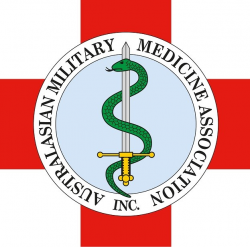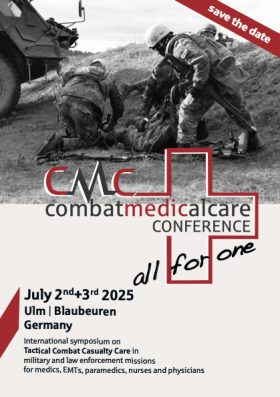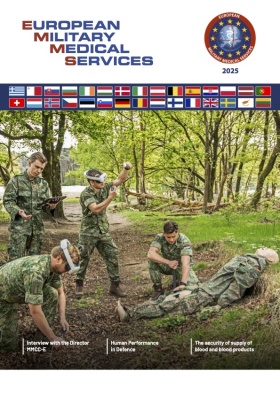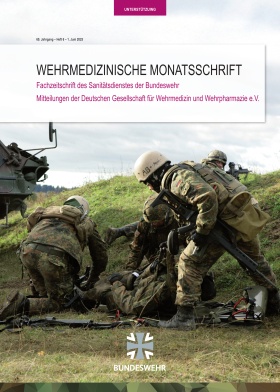
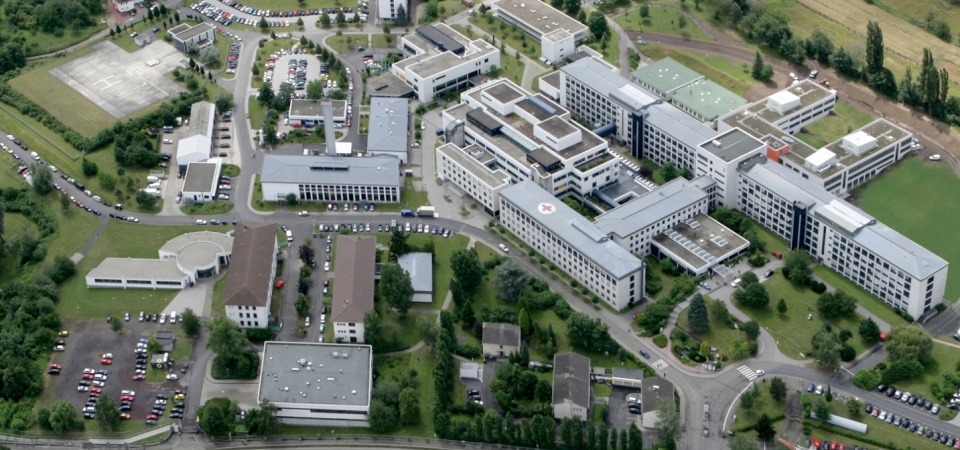
Article: D. Willms, A. Betzholz, M. Zallet (Germany)
Bundeswehr Central Hospital, Koblenz
The Bundeswehr Central Hospital (BwCenHosp) in Koblenz is the largest military medical treatment facility in the Federal Republic of Germany and firmly integrated in the civilian healthcare network of the Federal State of Rhineland-Palatinate. Built by the French Army in 1952 and taken over by the Bundeswehr in 1957, the Bundeswehr Central Hospital by now has 50 years of tradition in the Koblenz region.The staff comprises a total of 1,900 members; about half of them are soldiers. The guiding principle of the Hospital, "With competence and responsibility for the safety of our patients" is the rule of action of all personnel. As an academic teaching hospital, the Bundeswehr Central Hospital trains students during their one-year medical internship and is affiliated to the Johannes Gutenberg University Mainz.
Task
The central tasks of the Bundeswehr Central Hospital comprise provision of medical specialist personnel for deployments and exercises, including strategic aeromedical evacuation; basic, advanced and follow-on medical training of soldiers in the Medical Service; as well as preservation of the medical personnel's competence for deployments abroad.
 Rescue Helicopter
Rescue Helicopter
In the Bundeswehr Central Hospital, a total of 500 beds, 11 operating theaters, 2 specialist intensive care units, 2 intermediate care units, and 1 interdisciplinary reception unit are available for the medical treatment of patients. The Bundeswehr Central Hospital's inpatient and rehabilitative facilities are equally open to military and civilian patients. Approximately 15,000 inpatients and 85,000 outpatients each year are treated in the Bundeswehr Central Hospital. In addition, another 15,000 patients each year receive medical treatment in the Hospital's emergency treatment unit alone.
Interdisciplinary medical care for patients reaches well beyond the boundaries of the City of Koblenz. This is also proved by the ground and aeromedical evacuation by ADAC helicopters, which are a major element of the Hospital's tasks.
The pharmacy of the Bundeswehr Central Hospital produces pharmaceuticals for the Hospital and the assigned regional treatment facilities of the Medical Service.
Organization and Focus Areas
With its 18 specialist departments, the Bundeswehr Central Hospital is rated as a Level III (Central Care) medical facility and, thus, covers a broad spectrum of surgical and conservative medicine.
Civil-military Cooperation
The Bundeswehr Central Hospital is an educational establishment committed to the region and beside apprentice positions for prospective qualified medical and dental employees, pharmacy clerks, pharmaceutical technicians and dental technicians offers the opportunity to complete a voluntary social year.
Under the Civil-Military Cooperation program, the Bundeswehr Central Hospital runs numerous cooperation projects. This has enhanced the Hospital's performance profile and at the same time established a useful combination between mission-relevant medicine and high-tech medical care tailored to domestic requirements.
Patient Safety as the Highest Priority
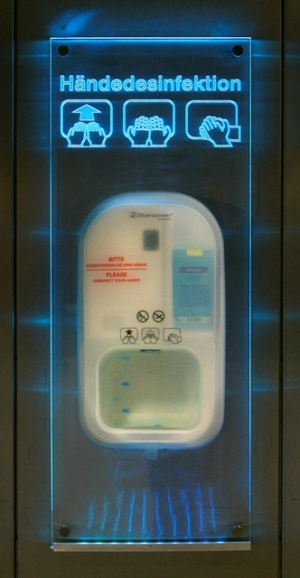 Hand
disinfectant
machine (IPSG 5)
Hand
disinfectant
machine (IPSG 5)
As one of currently four clinics in Germany, the Bundeswehr Central Hospital since October 2010 has been certified in compliance with the Joint Commission International Accreditation Standards for Hospitals. In February 2014, the first re-certification was completed successfully. The Bundeswehr Central Hospital in Koblenz, thus, is one of approximately 500 clinics worldwide having proved their performance and competence under this exclusive international certification system. The Hospital staff are strongly committed to this task they accomplish with extraordinary dedication and motivation.
This certification system checks whether the internal procedures in the Hospital ensure patient safety and a constantly high level of treatment quality.
All processes and activities within the 13 main standards of the Joint Commission International are geared to patient safety. The six International Patient Safety Goals (IPSG) are the foundation of the entire system:
IPSG 1 Identify Patients Correctly
IPSG 2 Improve Effective Communication
IPSG 3 Improve the Safety of High-Alert Medications
IPSG 4 Ensure Correct-Site, Correct-Procedure, Correct-Patient Surgery
IPSG 5 Reduce the Risk of Health Care-Associated Infections
IPSG 6 Reduce the Risk of Patient Harm Resulting from Falls
Within the scope of certification, an international commission checks approximately 1,200 criteria over a period of one week, including patient rights, continuity of medical care, building security, firefighting measures, or staff training. The level of compliance for the 1,200 criteria, here, must be above 95%. This illustrates the tremendous demands of this quality management system.
Already during admission procedures, the patients get in touch with the safety standards of the Bundeswehr Central Hospital when they get an identification strap. This identification strap serves the purpose of unambiguous patient identification and is responded to very positively by the patients.
Marking the surgical site, the preoperative verification process and the so-called time-out of the entire operative team are further measures to ensure that surgical procedures are in compliance with JCI standards. After completion of all safety measures and checks, the time-out is conducted immediately before starting a surgical procedure during which the surgical team with the aid of a checklist verifies patient identity, the correct surgical site and that all required documents and equipment are on hand, correct and functional.
Also medication on the general wards follows the strict JCI standards. Provision and administration of medical drugs as a matter of principle is done immediately at the patient bed to avoid mistakes and prevent information loss. To further increase the safety of medications, all potentially dangerous medications are not only labeled as such as usual, but beyond that these medications are specifically stained to rule out errors and incorrect administration.
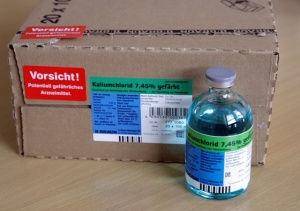 Specifically stained and
marked potentially dangerous
medication (IPSG 3)
Specifically stained and
marked potentially dangerous
medication (IPSG 3)
Patient protection against infections by so-called "hospital bugs" rates extremely high and is, thus, also anchored in one of the patient safety goals. In most cases, the numerous measures established and supervised by the hospital hygiene specialists in the Bundeswehr Central Hospital remain unnoticed by the patients. Plainly visible, however, are the eight hand disinfectant machines which due to their installation sites and a special illumination management draw attention. In everyday clinical practice, it is absolute routine for the staff to use the normal hand disinfectant dispensers in compliance with the procedures specified by the World Health Organization. Patients and visitors, however, make use of these dispensers only very rarely, although this can also make a key contribution to hand hygiene. For this reason, the new hand disinfectant machines have been installed at particularly frequented locations across the Bundeswehr Central Hospitals. They are to incite patients and visitors to disinfect their hands and in doing so support the numerous hygiene measures taken in the Bundeswehr Central Hospital.
To further enhance patient safety, all Bundeswehr Central Hospital personnel undergo regular resuscitation training to ensure quick and effective help also in medical emergencies in the Hospital. For this purpose, uniformly equipped and permanently available emergency trolleys are additionally available in all outpatient and inpatient units.
By these and many other measures a level of patient safety has been achieved in the Bundeswehr Central Hospital that can easily stand international comparison. However, this high standard can only be met if the procedures and processes specified under this quality management system are really practiced and continuously improved. By the successful re-certification, the Bundeswehr Central Hospital personnel have most impressively proved that this is the case.
Deployments Abroad
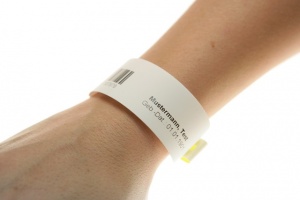 Patient identification strap
(IPSG 1)
Patient identification strap
(IPSG 1)
Within the scope of its international commitments, the Bundeswehr has been participating in deployments abroad for more than 20 years. This requires a high-performance and professional Medical Service capable of successfully treating sick and wounded soldiers far away from German hospitals. To achieve this goal, the guiding principle is that in cases of illness, accident or injury during deployments abroad, the soldiers will receive medical treatment in line with the medical standards they may expect in Germany.
In 2013, soldiers of the Bundeswehr Central Hospital performed 8960 man-days on deployments, 6900 of these as part of ISAF. On average, 25 of the 971 military personnel of the Bundeswehr Central Hospital were absent each day for operational reasons.
In the first half of 2014, on average 17 soldiers per day will be absent for operational reasons. From January 2014 to mid-July 2014, personnel of the Bundeswehr Central Hospital will have performed 3588 man-days on deployments.
Development Planning and Way Ahead
The infrastructure of the Bundeswehr Central Hospital is continuously developed and modernized to cope with new requirements in patient treatment. At present, a modern ward building with 160 beds is in the construction phase which will be able to receive the first patients starting in 2016.
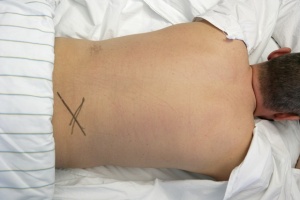 Unambiguous marking of the
surgical site (IPSG 4)
Unambiguous marking of the
surgical site (IPSG 4)
Compatibility of family and duty is a high priority for the Bundeswehr Central Hospital in Koblenz. Creating a high-quality, reliable and flexible child care facility in the immediate vicinity of the workplace is a major step towards this end. At present, a corporate kindergarten with 42 child care places is being built on the premises of the Bundeswehr Central Hospital. Already starting in October 2014, the first children will be cared for, here.
Recently, also the development plans for a comprehensive new construction project for the Hospital was approved at ministerial level. In a first construction phase which will be implemented over the next eight years, a new central building including, among others, 17 surgical units, a large intensive care unit and a new emergency room as well as a radiology unit and a new central pharmacy will be built. The further development will then give a new home to the outpatient clinics and create the infrastructure for another 271 beds.
On this basis, the Bundeswehr Central Hospital intends not only to further expand its leading role among the teaching and treatment facilities in the Bundeswehr Medical Service in the years to come, but also to become one of the most attractive employers in the health care system of the Federal Republic of Germany.
www.bundeswehrkrankenhaus-koblenz.de
Date: 02/18/2019
Source: Medical Corps International Forum (2/2014)
